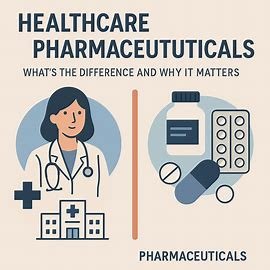Healthcare vs. Pharmaceuticals: What’s the Difference and Why It Matters
Many people often use the terms “healthcare” and “pharmaceuticals” interchangeably, but they represent distinct parts of the medical ecosystem. Understanding the difference is crucial for patients, policymakers, and anyone navigating the healthcare system.
Healthcare: A Broad System of Care
Healthcare refers to the full spectrum of services provided to maintain or improve a person’s health. This includes preventive care, diagnosis, treatment, rehabilitation, and palliative care. Healthcare is delivered by doctors, nurses, therapists, and other medical professionals across hospitals, clinics, and community health settings.
Key aspects of healthcare include:
- Preventive care: Vaccinations, screenings, and wellness programs.
- Clinical care: Diagnosing and treating illnesses.
- Patient support services: Counseling, nutrition advice, and rehabilitation programs.
Pharmaceuticals: Medicine and Drug Development
Pharmaceuticals are a subset of healthcare, focusing specifically on the development, production, and sale of medications. Pharmaceuticals play a crucial role in preventing, managing, and curing diseases through drugs designed for specific conditions.
Key aspects of pharmaceuticals include:
- Drug research and development: Creating new medications through clinical trials.
- Manufacturing and distribution: Producing and supplying medicines to pharmacies and hospitals.
- Regulation and safety: Ensuring drugs meet safety and efficacy standards.
Why the Difference Matters
Recognizing the difference between healthcare and pharmaceuticals helps in understanding how each contributes to health outcomes. Healthcare is about the overall well-being and care of patients, while pharmaceuticals provide the tools—medications—that make treatment possible.
Understanding this distinction is important because:
- It helps patients make informed decisions about their care.
- Policymakers can allocate resources effectively between healthcare services and drug development.
- Healthcare providers can integrate treatments more efficiently, combining care with medication management.
Conclusion
While healthcare and pharmaceuticals are closely connected, they serve different roles. Healthcare focuses on comprehensive patient care, whereas pharmaceuticals supply the medications that support and enhance that care. Appreciating this distinction is key to improving health outcomes, policy planning, and patient experiences.

Leave a Reply